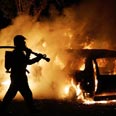
Paris intifada
Many Israelis believe France ‘deserves’ ongoing rioting
The French Foreign Ministry complains that the international media is fanning the flames of Islamic riots in the suburbs of Paris. But even as the government complains, the riots are spreading to other French cities, particularly to the ones with large immigrant populations from North Africa.
The leaders of the riots are French-born children of immigrants. They are a generation of angry and embittered European Muslims, alienated from society, economic hardship and hazy self-identity. They are creating within themselves tremendous hatred for their surroundings, and it takes no more than a small spark to ignite them.
French police have failed up to now in putting down the disturbances. The political echelon has instructed widespread restraint, thus allowing gangs of hoodlums to harm property, public order and other aspects of daily life. Political correctness, in the very worst, almost grotesque, sense of that phrase, is preventing Paris police from attending to their most basic duty: To protect citizens from rioters.
The government hopes the riots will run their course and fizzle out by themselves. But this is a flawed tactic, for which the Republic will ultimately pay a dear price. Arson against schools, warehouses and cars – and ultimately, people – is outside the guidelines of "understandable" social or religious protest. This is not protest; it is criminality, pure and simple.
Encouraging anarchy
A forgiving attitude towards the criminals because they are Muslims will not do them any good, nor will send a sign that the state is strong. And the culture of law enforcement, interpreted by the rioters as weakness, will encourage them to commit more serious acts after they regroup.
"They deserve it," say many Israelis about the Paris intifada: The French "deserve it" for their one-sidedness with regard to the al-Aqsa intifada, "deserve it" for their understanding of Palestinian suicide bombers, and they especially "deserve it" for pointedly ignoring a flourishing Muslim problem in their own house, in view of the Louvre.
But now it is impossible to ignore: In France, as in other parts of Europe, there is a large Muslim minority that feels no kinship with European civilization. Each one rejects the other.
This minority is seeking and finding its spiritual and cultural homeland in radical Islam. Wandering outside the borders of the Christian-European nation, they are drawn in and accepted by the "Islamic nation."
European problem
Muslim neighborhoods in many European cities – London, Madrid, Hamburg, Amsterdam, Rome and Paris – are today centers of radicalism and terror, fertile incubators for jihad and anti-Israeli activity. The traditional leadership, which preached assimilation, has lost its authority and has been replaced with various preachers of religious extremism.
Several organize outside the known mosque framework, distribute their message from person-to-person, and (mainly) from computer-to-computer.
"Radical Islam", wrote Francis Fukiyama in the Wall Street Journal over the weekend, tells (disenfranchised European Muslims) exactly who they are- respected members of a global Muslim umma to which they can belong despite their lives in lands of unbelief."
It is not at all clear whether the vision of a united, democratic Europe include the Islamism of North African immigrants and their children. It was created without taking into account the existence of a militant Muslim minority.
"Democracy in Europe will be in big trouble in the future as Muslims become an ever larger percentage of the population," wrote Fukiyama. "And since Europe is today one of the main battlegrounds of the war on terrorism, this reality will matter for the rest of us as well."
But the troubles have already started: Terror in London, terror cells in Amsterdam and intifada in Paris.
This is just the beginning, not the end.
Sever Plocker is a columnist for Israel's leading newspaper Yedioth Ahronoth










